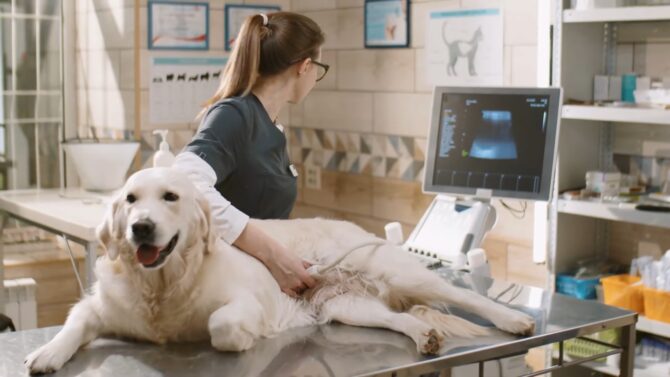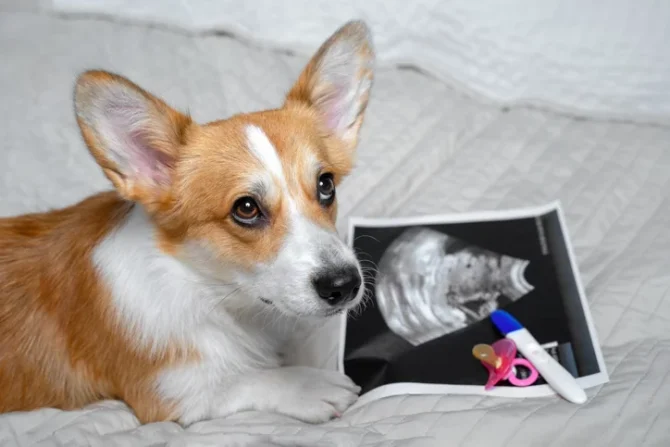Bringing a new furry life into your home is an exciting journey, especially when it involves adorable puppies. Have you ever wondered how long a dog’s pregnancy lasts and what to expect during those heartwarming weeks?
From the magical moment of conception to the playful paws of newborns, we’ll guide you through this incredible process with simple and relatable insights. Get ready to embark on a heartwarming adventure of growth, anticipation, and puppy joy!
Canine Reproduction
Dogs, like humans, have a unique reproductive system. However, the duration and stages of their pregnancies differ significantly from ours. Before we delve into the specifics of canine gestation, it’s essential to understand the basics of their reproductive cycle.
The Estrous Cycle

Female dogs, or bitches, don’t experience menstrual cycles like humans. Instead, they have an estrous cycle, which occurs roughly twice a year. This cycle is divided into four stages: proestrus, estrus, diestrus, and anestrus.
During the proestrus stage, the female attracts males but isn’t receptive to mating. The estrus phase is when she’s fertile and will accept a male. Diestrus follows, during which she’s no longer interested in mating. Finally, anestrus is a resting period.
Mating and Conception
Once a female dog is in the estrus phase, she can conceive. Mating doesn’t guarantee pregnancy, but if successful, fertilization usually occurs within a few days. Unlike humans, dogs can mate with multiple partners during one cycle, leading to litters with multiple fathers.
The Duration of Dog Pregnancy
Average Gestation Period
The average gestation period for dogs is about 63 days or roughly two months. However, this can vary between 58 to 68 days depending on the breed and individual dog. Smaller breeds might deliver a few days earlier, while larger breeds might take a bit longer.
Factors Affecting Pregnancy Duration
Several factors can influence the length of a dog’s pregnancy. Nutrition, age, health, and the number of pups can all play a role. For instance, a younger, healthy dog might have a shorter gestation period compared to an older one.
Similarly, a dog carrying a smaller litter might deliver sooner than one with a larger litter.
How to Recognize the Stages of Pregnancy?
Just as human pregnancies have trimesters, dogs go through various stages during their gestation period. Recognizing these can help owners provide the best care for their pregnant pets.
Early Stage: Days 1-21
During the first three weeks, there aren’t many noticeable changes. However, hormonal shifts and embryonic development are in full swing. Some dogs might experience morning sickness, but it’s relatively rare.
By the end of this stage, the embryos attach to the uterus.
Middle Stage: Days 22-45
This stage is when things start to get exciting! The fetuses begin to develop more rapidly, and by day 28, their heartbeats can be detected. Owners might notice their dog gaining weight and her abdomen expanding.
It’s crucial to provide proper nutrition during this stage to support the growing puppies.
Final Stage: Days 46-63
The final stretch of the pregnancy sees the most rapid growth of the puppies. The mother’s abdomen becomes quite large, and her nipples darken and enlarge in preparation for nursing. During the last week, the dog might start nesting, seeking out a quiet place to give birth.
Prenatal Care
Ensuring the health and well-being of a pregnant dog is paramount. Proper prenatal care can make a significant difference in the health of both the mother and her puppies.
Nutrition and Diet
As the pregnancy progresses, the nutritional needs of the dog increase. It’s essential to provide a balanced diet rich in proteins, fats, and essential vitamins.
Many veterinarians recommend high-quality puppy food during the latter half of pregnancy, as it’s formulated to support growth.
Regular Check-ups

Regular veterinary check-ups are crucial during pregnancy. These visits can help monitor the health of the mother and the development of the puppies. Ultrasounds, X-rays, and blood tests might be conducted to ensure everything is progressing smoothly.
The Birthing Process: What to Expect
As the end of the gestation period approaches, it’s essential to be prepared for the birthing process, also known as whelping.
Signs of Labor
Several signs indicate that a dog is about to give birth. These include a drop in body temperature, restlessness, loss of appetite, and nesting behavior. Some dogs might also have a clear vaginal discharge.
The Whelping Process
The birthing process can last anywhere from a few hours to two days. Dogs usually give birth to a puppy every 30 to 60 minutes, with 10-30 minute breaks in between. It’s crucial to provide a calm and comfortable environment for the mother.
While most dogs can deliver without human intervention, it’s essential to monitor for any signs of distress or complications.
Postnatal Care: Ensuring Healthy Puppies
Once the puppies are born, the work isn’t over. The first few weeks of a puppy’s life are crucial for its development and health.
Feeding and Nutrition

For the first four weeks, puppies rely solely on their mother’s milk for nutrition. It’s essential to ensure that the mother is well-fed and hydrated to produce enough milk. By the third week, puppies can start being introduced to wet puppy food.
Health Check-ups and Vaccinations
Puppies are vulnerable to various diseases and infections. Regular veterinary check-ups are crucial during the first few weeks. Vaccinations typically begin when puppies are around six to eight weeks old and continue throughout their first year.
Common Concerns and Complications

While many dog pregnancies progress without issues, it’s essential to be aware of potential complications and know when to seek veterinary assistance.
Pregnancy and Whelping Complications
Some dogs might experience difficulties during pregnancy or delivery. These can include miscarriage, prolonged labor, or dystocia (difficult birth). It’s essential to be vigilant and seek veterinary help if you notice any signs of distress in the mother.
Puppy Health Concerns
Puppies can face various health challenges, from congenital conditions to infections. Regular check-ups can help identify and address these issues early on. It’s also essential to monitor for signs of malnutrition or failure to thrive.
Spaying and Future Pregnancies
After experiencing a dog’s pregnancy, some owners might consider whether they should allow their dog to breed again or opt for spaying.
The Benefits of Spaying
Spaying a dog has several benefits, including preventing unwanted litters, reducing the risk of certain diseases, and eliminating the challenges and risks associated with pregnancy.
Deciding on Future Pregnancies
If you’re considering letting your dog breed again, it’s essential to weigh the pros and cons. Consider the health of the dog, the demand for puppies, and your ability to provide adequate care throughout the process.
FAQs:
How can I ensure the health of the puppies as they grow?
Regular veterinary check-ups, vaccinations, proper nutrition, socialization, and a safe environment are crucial for their well-being.
When can the puppies leave their mother and go to new homes?
Puppies are typically ready to go to new homes around 8 to 10 weeks of age, once they’ve been weaned and are stable.
How long does the birthing process usually take?
The birthing process can last from several hours to a day. If it exceeds 24 hours without progress, contact your vet.
Can a pregnant dog still exercise?
Yes, moderate exercise is generally beneficial, but avoid excessive strain. Consult your vet for exercise guidelines based on your dog’s health.
Is it normal for a pregnant dog to have vaginal discharge?
Some clear or slightly bloody discharge can be normal, but excessive discharge, odor, or changes in color should be evaluated by a vet.
Conclusion
Witnessing the birth and growth of puppies is a rewarding experience. By understanding the intricacies of canine pregnancy, from conception to birth and beyond, dog owners can ensure the health and happiness of their furry family members.
Remember, every dog and pregnancy is unique. Always consult with a veterinarian to provide the best care for your pregnant dog and her puppies.






